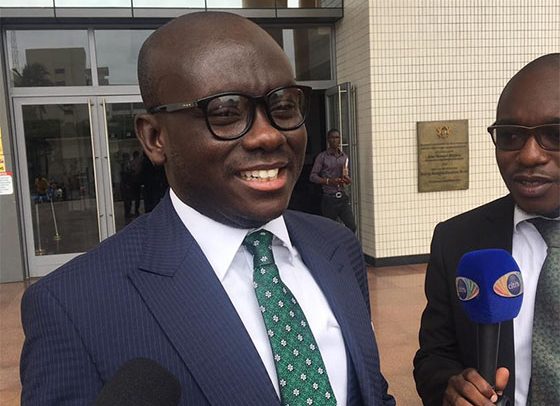Godfred Yeboah Dame
The Attorney General, Godfred Yeboah Dame, has described an application for interlocutory injunction filed by some Minority Members of Parliament against the implementation of the Electronic Transfer Levy (E-Levy) as incompetent and saddled with “factual uncertainties”.
These uncertainties, the AG in an affidavit in opposition to the motion argues the plaintiffs have failed to make out a case for the Supreme Court to grant an injunction.
Parliament on Tuesday, March 29, 2022, passed the 1.5% levy on electronic transactions, with the Minority walking out of Parliament in protest of the passage.
President Nana Akufo-Addo has assented to the bill, and the Ghana Revenue Authority (GRA) on Sunday commenced the implementation of the levy.
Minority Leader, Haruna Iddrisu together with his colleague NDC MPs, Mahama Ayariga and Samuel Okudzeto Ablakwa after the passage of the bill filed a writ at the Supreme Court contesting that Parliament did not have the required number to form a quorum to vote and approve the E-Levy Act (Act 1075).
They later filed an application for interlocutory injunction against the implementation of the Act pending the determination of their suit.
But the Attorney General in his affidavit in opposition makes reference to what he terms “factual uncertainties” in the plaintiffs’ application, and says that same shows that their application is incompetent, and that, the plaintiffs have failed to make out a case for the Supreme Court to grant an injunction.
He avers that the factual uncertainties contained in the plaintiff’s case, is displayed in their allegation that “there were only 136 or the purported 137 members from the Majority caucus present in the Chamber of Parliament” when the E-Levy Act was passed.
“The fact that plaintiffs are not even sure of the exact number of Members of Parliament present in Parliament for the passage of the E-Levy Bill (whether there were 136 or 137 MPs present in Parliament), is fatal to their case and demonstrates that plaintiffs have no cause of action,” Mr. Dame argues.
The AG further argues that “plaintiffs have failed to demonstrate any facts, or the commission of any act or an omission on the part of Parliament in the constitutionally prescribed procedure for the passage of the Electronic Transfer Levy Act, 2022 (Act 1075) which vests them with a cause of action” in the Supreme Court.
This, in the opinion of the Attorney General, makes the entire suit as well as the application for interlocutory injunction incompetent.
Attached to the AG’s affidavit is the official record of the 37th sitting of the first meeting of Parliament on March 29, 2022, which according to him clearly shows that there were 266 Members of Parliament present in Parliament when the question whether to approve the Electronic Transfer Levy Bill was put after the second reading of the E-Levy Bill, before the bill was passed into law.
The Exhibit further shows that the E-Levy Bill was consequently passed by a voice vote and the AG says this shows, therefore, that the allegations by plaintiffs about the number that passed the E-Levy Bill, which they are not even sure whether it was 136 or 137, is immaterial.
Mr. Dame further argues that by March 29, 2022, the number constitutionally required for a decision to be made by Parliament was 137, there being only 274 validly elected Members of Parliament as the election of the MP for Assin North, James Gyakye Quayson, had been cancelled by the Cape Coast High Court and his appeal also struck out by the Court of Appeal on March 22, 2022.
Again, the Attorney General argues that for the avoidance of doubt, the Votes and Proceedings of Parliament showed that apart from Sarah Adwoa Safo, NPP MP for Dome Kwabenya, all the other 137 members of the Majority caucus were present in the Chamber, with the NDC rather missing as many as eight (8) members.
This, he said, meant that the NDC had only 128 MPs in Parliament on the day the E-Levy was passed whilst the NPP had 137 MPs present, thus satisfying the quorum of 137 constitutionally required for the taking of a decision in Parliament, following the cancellation of the election of Mr. Quayson.
“There is a constitutional and statutory presumption of regularity of all laws passed in Ghana and therefore, an injunction to restrain the enforcement of the E-Levy Act 1075 is unjustified, especially as plaintiffs have failed to demonstrate a cause of action,” he said.
Mr. Dame added that the NDC MPs have “failed to show how the reliefs sought by them in the substantive suit will be defeated or rendered nugatory by a refusal of an interlocutory injunction”.
BY Gibril Abdul Razak


